- Home
- Ken Follett
The Man From St. Petersburg Page 3
The Man From St. Petersburg Read online
Page 3
Charlotte said: "When a hen lays an egg, it comes out . . . behind." She avoided Belinda's eyes. She had never had such an intimate conversation with anyone, ever. "The egg seems too big, but it does come out."
Belinda leaned closer and spoke quietly. "I saw Daisy drop a calf once. She's the Jersey cow on the Home Farm. The men didn't know I was watching. That's what they call it, 'dropping' a calf."
Charlotte was fascinated. "What happened?"
"It was horrible. It looked as if her tummy opened up, and there was a lot of blood and things." She shuddered.
"It makes me scared," Charlotte said. "I'm afraid it will happen to me before I find out all about it. Why won't they tell us?"
"We shouldn't be talking about such things."
"We've damn well got a right to talk about them!"
Belinda gasped. "Swearing makes it worse!"
"I don't care." It maddened Charlotte that there was no way to find out these things, no one to ask, no book to consult . . . She was struck by an idea. "There's a locked cupboard in the library--I bet there are books about all this sort of thing in there. Let's look!"
"But if it's locked . . ."
"Oh, I know where the key is. I've known for years."
"We'll be in terrible trouble if we're caught."
"They're all changing for dinner now. This is our chance." Charlotte stood up.
Belinda hesitated. "There'll be a row."
"I don't care if there is. Anyway, I'm going to look in the cupboard, and you can come if you want." Charlotte turned and walked toward the house. After a moment Belinda ran up beside her, as Charlotte had known she would.
They went through the pillared portico and into the cool, lofty great hall. Turning left, they passed the morning room and the Octagon, then entered the library. Charlotte told herself she was a woman and entitled to know, but all the same she felt like a naughty little girl.
The library was her favorite room. Being on a corner of the house it was very bright, lit by three big windows. The leather-upholstered chairs were old and surprisingly comfortable. In winter there was a fire all day, and there were games and jigsaw puzzles as well as two or three thousand books. Some of the books were ancient, having been here since the house was built, but many were new, for Mama read novels and Papa was interested in lots of different things--chemistry, agriculture, travel, astronomy and history. Charlotte liked particularly to come here on Marya's day off, when the governess was not able to snatch away Far from the Madding Crowd and replace it with The Water Babies. Sometimes Papa would be here with her, sitting at the Victorian pedestal desk and reading a catalogue of agricultural machinery or the balance sheet of an American railroad, but he never interfered with her choice of books.
The room was empty now. Charlotte went straight to the desk, opened a small, square drawer in one of the pedestals and took out a key.
There were three cupboards against the wall beside the desk. One contained games in boxes and another had cartons of writing paper and envelopes embossed with the Walden crest. The third was locked. Charlotte opened it with the key.
Inside were twenty or thirty books and a pile of old magazines. Charlotte glanced at one of the magazines. It was called The Pearl. It did not seem promising. Hastily, she picked out two books at random, without looking at the titles. She closed and locked the cupboard and replaced the key in the desk drawer.
"There!" she said triumphantly.
"Where can we go to look at them?" Belinda hissed.
"Remember the hideaway?"
"Oh! Yes!"
"Why are we whispering?"
They both giggled.
Charlotte went to the door. Suddenly she heard a voice in the hall, calling: "Lady Charlotte . . . Lady Charlotte . . ."
"It's Annie; she's looking for us," Charlotte said. "She's nice, but so dim-witted. We'll go out the other way, quickly." She crossed the library and went through the far door into the billiard room, which led in turn to the gun room; but there was someone in the gun room. She listened for a moment.
"It's my papa," Belinda whispered, looking scared. "He's been out with the dogs."
Fortunately there was a pair of French doors from the billiard room on the west terrace. Charlotte and Belinda crept out and closed the doors quietly behind them. The sun was low and red, casting long shadows across the lawns.
"Now how do we get back in?" Belinda said.
"Over the roofs. Follow me!"
Charlotte ran around the back of the house and through the kitchen garden to the stables. She stuffed the two books into the bodice of her dress and tightened her belt so they should not fall out.
From a corner of the stable yard she could climb, by a series of easy steps, to the roof over the servants' quarters. First she stood on the lid of a low iron bunker which was used to store logs. From there she hauled herself onto the corrugated tin roof of a lean-to shed where tools were kept. The shed leaned against the washhouse. She stood upright on the corrugated tin and lifted herself onto the slate roof of the washhouse. She turned to look behind: Belinda was following.
Lying facedown on the sloping slates, Charlotte edged along crabwise, holding on with the palms of her hands and the sides of her shoes, until the roof ended up against a wall. Then she crawled up the roof and straddled the ridge.
Belinda caught up with her and said: "Isn't this dangerous?"
"I've been doing it since I was nine years old."
Above them was the window of an attic bedroom shared by two parlormaids. The window was high in the gable, its top corners almost reaching the roof, which sloped down on either side. Charlotte stood upright and peeped into the room. No one was there. She pulled herself onto the window ledge and stood up.
She leaned to the left, got an arm and a leg over the edge of the roof and hauled herself onto the slates. She turned back and helped Belinda up.
They lay there for a moment, catching their breath. Charlotte remembered being told that Walden Hall had four acres of roof. It was hard to believe until you came up here and realized you could get lost among the ridges and valleys. From this point it was possible to reach any part of the roofs by using the footways, ladders and tunnels provided for the maintenance men who came every spring to clean gutters, paint drainpipes and replace broken tiles.
Charlotte got up. "Come on, the rest is easy," she said.
There was a ladder to the next roof, then a board footway, then a short flight of wooden steps leading to a small, square door set in a wall. Charlotte unlatched the door and crawled through, and she was in the hideaway.
It was a low, windowless room with a sloping ceiling and a plank floor which would give you splinters if you were not careful. She imagined it had once been used as a storeroom: anyway, it was now quite forgotten. A door at one end led into a closet off the nursery, which had not been used for many years. Charlotte had discovered the hideaway when she was eight or nine and had used it occasionally in the game--which she seemed to have been playing all her life--of escaping from supervision. There were cushions on the floor, candles in jars and a box of matches. On one of the cushions lay a battered and floppy toy dog, which had been hidden there eight years ago after Marya, the governess, had threatened to throw him away. A tiny occasional table bore a cracked vase full of colored pencils and a red leather writing case. Walden Hall was inventoried every few years, and Charlotte could recall Mrs. Braithwaite, the housekeeper, saying that the oddest things went missing.
Belinda crawled in, and Charlotte lit the candles. She took the two books from her bodice and looked at the titles. One was called Household Medicine and the other The Romance of Lust. The medical book seemed more promising. She sat on a cushion and opened it. Belinda sat beside her, looking guilty. Charlotte felt as if she were about to discover the secret of life.
She leafed through the pages. The book seemed explicit and detailed on rheumatism, broken bones and measles, but when it arrived at childbirth it suddenly became impenetrably vague
. There was some mysterious stuff about cramps, waters breaking, and a cord which had to be tied in two places, then cut with scissors which had been dipped in boiling water. This chapter was evidently written for people who already knew a lot about the subject. There was a drawing of a naked woman. Charlotte noticed, but was too embarrassed to tell Belinda, that the woman in the drawing had no hair in a certain place where Charlotte had a great deal. Then there was a diagram of a baby inside a woman's tummy, but no indication of a passage by which the baby might emerge.
Belinda said: "It must be that the doctor cuts you open."
"Then what did they do in history, before there were doctors?" Charlotte said. "Anyway, this book's no good." She opened the other at random and read aloud the first sentence that came to her eye. "She lowered herself with lascivious slowness until she was completely impaled upon my rigid shaft. Whereupon she commenced her delicious rocking movements to and fro." Charlotte frowned, and looked at Belinda.
"I wonder what it means?" said Belinda.
Feliks Kschessinsky sat in a railway carriage waiting for the train to pull out of Dover Station. The carriage was cold. He was quite still. It was dark outside, and he could see his own reflection in the window: a tall man with a neat mustache, wearing a black coat and a bowler hat. There was a small suitcase on the rack above his head. He might have been the traveling representative of a Swiss watch manufacturer, except that anyone who looked closely would have seen that the coat was cheap, the suitcase was cardboard and the face was not the face of a man who sold watches.
He was thinking about England. He could remember when, in his youth, he had upheld England's constitutional monarchy as the ideal form of government. The thought amused him, and the flat white face reflected in the window gave him the ghost of a smile. He had since changed his mind about the ideal form of government.
The train moved off, and a few minutes later Feliks was watching the sun rise over the orchards and hop fields of Kent. He never ceased to be astonished at how pretty Europe was. When he first saw it he had suffered a profound shock, for like any Russian peasant he had been incapable of imagining that the world could look this way. He had been on a train then, he recalled. He had crossed hundreds of miles of Russia's thinly populated northwestern provinces, with their stunted trees, their miserable villages buried in snow and their winding mud roads; then, one morning, he had woken up to find himself in Germany. Looking at the neat green fields, the paved roads, the dainty houses in the clean villages and the flower beds on the sunny station platform, he had thought he was in Paradise. Later, in Switzerland, he had sat on the veranda of a small hotel, warmed by the sun yet within sight of snow-covered mountains, drinking coffee and eating a fresh, crusty roll, and he had thought: People here must be so happy.
Now, watching the English farms come to life in the early morning, he recalled dawn in his home village--a gray, boiling sky and a bitter wind; a frozen swampy field with puddles of ice and tufts of coarse grass rimed with frost; himself in a worn canvas smock, his feet already numb in felt shoes and clogs; his father striding along beside him, wearing the threadbare robes of an impoverished country priest, arguing that God was good. His father had loved the Russian people because God loved them. It had always been perfectly obvious to Feliks that God hated the people, for he treated them so cruelly.
That discussion had been the start of a long journey, a journey which had taken Feliks from Christianity through socialism to anarchist terror, from Tambov province through St. Petersburg and Siberia to Geneva. And in Geneva he had made the decision which brought him to England. He recalled the meeting. He had almost missed it . . .
He almost missed the meeting. He had been to Krakow, to negotiate with the Polish Jews who smuggled the magazine Mutiny across the border into Russia. He arrived in Geneva after dark and went straight to Ulrich's tiny back-street printing shop. The editorial committee was in session--four men and two girls, gathered around a candle, in the rear of the shop behind the gleaming press, breathing the smells of newsprint and oiled machinery, planning the Russian Revolution.
Ulrich brought Feliks up to date on the discussion. He had seen Josef, a spy for the Okhrana, the Russian secret police. Josef secretly sympathized with the revolutionaries and gave the Okhrana false information for their money. Sometimes the anarchists would give him true but harmless tidbits, and in return Josef warned them of Okhrana activities.
This time Josef's news had been sensational. "The Czar wants a military alliance with England," Ulrich told Feliks. "He is sending Prince Orlov to London to negotiate. The Okhrana know about it because they have to guard the Prince on the journey through Europe."
Feliks took off his hat and sat down, wondering whether this was true. One of the girls, a sad, shabby Russian, brought him tea in a glass. Feliks took a half-eaten lump of sugar from his pocket, placed it between his teeth and sipped the tea through the sugar in the peasant manner.
"The point being," Ulrich went on, "that England could then have a war with Germany and make the Russians fight it."
Feliks nodded.
The shabby girl said: "And it won't be the princes and counts who get killed--it will be the ordinary Russian people."
She was right, Feliks thought. The war would be fought by the peasants. He had spent most of his life among these people. They were hard, surly and narrow-minded, but their foolish generosity and their occasional spontaneous outbursts of sheer fun gave a hint of how they might be in a decent society. Their concerns were the weather, animals, disease, childbirth and outwitting the landlord. For a few years, in their late teens, they were sturdy and straight, and could smile and run fast and flirt; but soon they became bowed and gray and slow and sullen. Now Prince Orlov would take those young men in the springtime of their lives and march them in front of a cannon to be shot to pieces or maimed forever, no doubt for the very best reasons of international diplomacy.
It was things like this that made Feliks an anarchist.
"What is to be done?" said Ulrich.
"We must blaze the news across the front pages of Mutiny!" said the shabby girl.
They began to discuss how the story should be handled. Feliks listened. Editorial matters interested him little. He distributed the magazine and wrote articles about how to make bombs, and he was deeply discontented. He had become terribly civilized in Geneva. He drank beer instead of vodka, wore a collar and a tie and went to concerts of orchestral music. He had a job in a bookshop. Meanwhile Russia was in turmoil. The oil workers were at war with the Cossacks, the parliament was impotent and a million workers were on strike. Czar Nicholas II was the most incompetent and asinine ruler a degenerate aristocracy could produce. The country was a powder barrel waiting for a spark, and Feliks wanted to be that spark. But it was fatal to go back. Joe Stalin had gone back, and no sooner had he set foot on Russian soil than he had been sent to Siberia. The secret police knew the exiled revolutionaries better than they knew those still at home. Feliks was chafed by his stiff collar, his leather shoes and his circumstances.
He looked around at the little group of anarchists: Ulrich, the printer, with white hair and an inky apron, an intellectual who loaned Feliks books by Proudhon and Kropotkin but also a man of action who had once helped Feliks rob a bank; Olga, the shabby girl, who had seemed to be falling in love with Feliks until, one day, she saw him break a policeman's arm and became frightened of him; Vera, the promiscuous poetess; Yevno, the philosophy student who talked a lot about a cleansing wave of blood and fire; Hans, the watchmaker who saw into people's souls as if he had them under his magnifying glass; and Pyotr, the dispossessed Count, writer of brilliant economic tracts and inspirational revolutionary editorials. They were sincere and hardworking people, and all very clever. Feliks knew their importance, for he had been inside Russia among the desperate people who waited impatiently for smuggled newspapers and pamphlets and passed them from hand to hand until they fell to pieces. Yet it was not enough, for economic tracts were no pro
tection against police bullets, and fiery articles would not burn palaces.
Ulrich was saying: "This news deserves wider circulation than it will get in Mutiny. I want every peasant in Russia to know that Orlov would lead him into a useless and bloody war over something that concerns him not at all."
Olga said: "The first problem is whether we will be believed."
Feliks said: "The first problem is whether the story is true."
"We can check," Ulrich said. "The London comrades could find out whether Orlov arrives when he is supposed to arrive, and whether he meets the people he needs to meet."
"It's not enough to spread the news," Yevno said excitedly. "We must put a stop to this!"
"How?" said Ulrich, looking at young Yevno over the top of his wire-rimmed spectacles.
"We should call for the assassination of Orlov--he is a traitor, betraying the people, and he should be executed."
"Would that stop the talks?"
"It probably would," said Count Pyotr. "Especially if the assassin were an anarchist. Remember, England gives political asylum to anarchists, and this infuriates the Czar. Now, if one of his princes were killed in England by one of our comrades, the Czar might well be angry enough to call off the whole negotiation."
Yevno said: "What a story we would have then! We could say that Orlov had been assassinated by one of us for treason against the Russian people."
"Every newspaper in the world would carry that report," Ulrich mused.
"Think of the effect it would have at home. You know how Russian peasants feel about conscription--it's a death sentence. They hold a funeral when a boy goes into the army. If they learned that the Czar was planning to make them fight a major European war, the rivers would run red with blood . . ."
He was right, Feliks thought. Yevno always talked like that, but this time he was right.
Ulrich said: "I think you're in dreamland, Yevno. Orlov is on a secret mission--he won't ride through London in an open carriage waving to the crowds. Besides, I know the London comrades--they've never assassinated anyone. I don't see how it can be done."

 The Pillars of the Earth
The Pillars of the Earth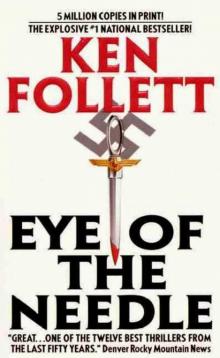 Eye Of The Needle
Eye Of The Needle Lie Down With Lions
Lie Down With Lions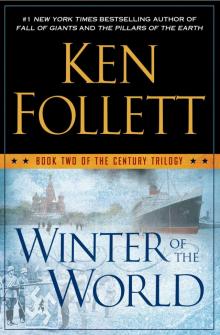 Winter of the World
Winter of the World Triple
Triple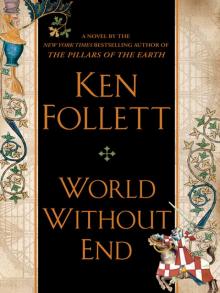 World Without End
World Without End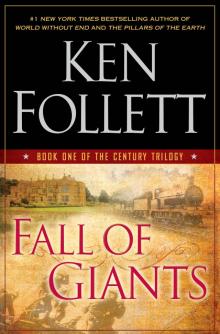 Fall of Giants
Fall of Giants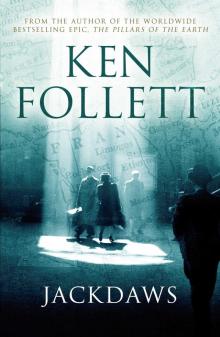 Jackdaws
Jackdaws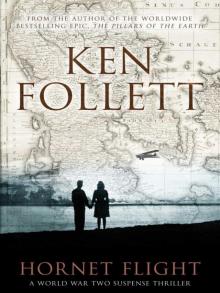 Hornet Flight
Hornet Flight Whiteout
Whiteout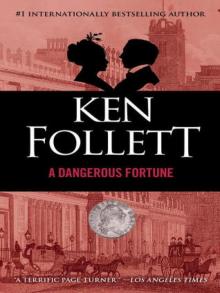 A Dangerous Fortune
A Dangerous Fortune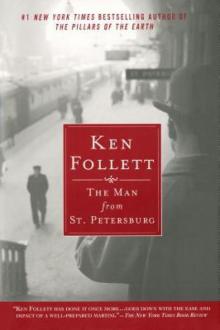 The Man From St. Petersburg
The Man From St. Petersburg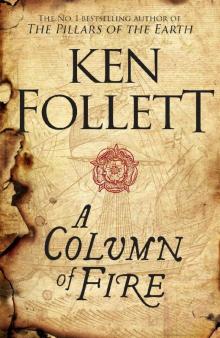 A Column of Fire
A Column of Fire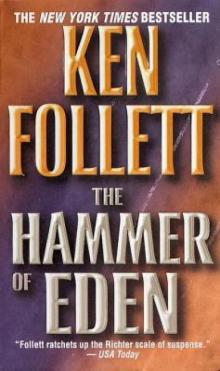 The Hammer of Eden
The Hammer of Eden On Wings of Eagles
On Wings of Eagles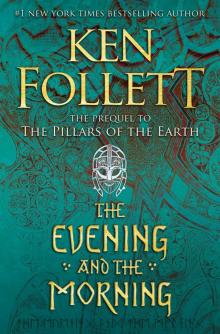 The Evening and the Morning
The Evening and the Morning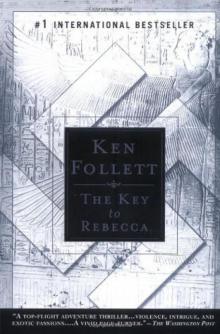 The Key to Rebecca
The Key to Rebecca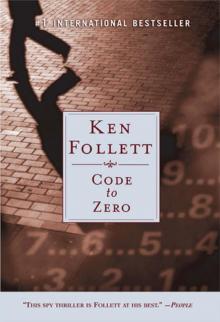 Code to Zero
Code to Zero Paper Money
Paper Money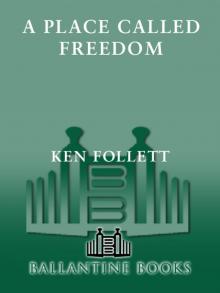 A Place Called Freedom
A Place Called Freedom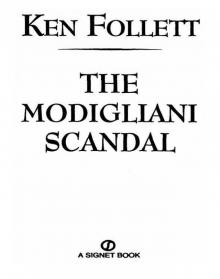 The Modigliani Scandal
The Modigliani Scandal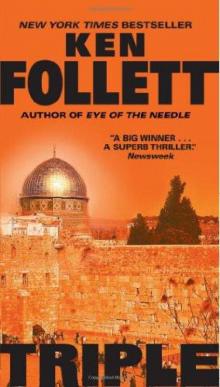 Triple (1991)
Triple (1991)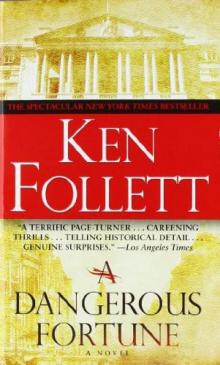 A Dangerous Fortune (1994)
A Dangerous Fortune (1994)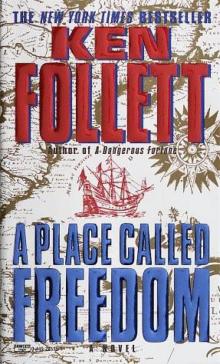 A Place Called Freedom (1995)
A Place Called Freedom (1995)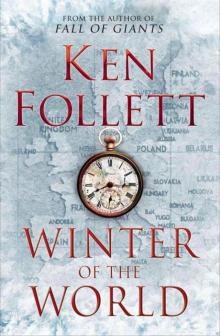 Winter of the World (Century Trilogy 2)
Winter of the World (Century Trilogy 2)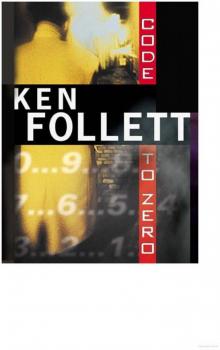 Code to Zero (2000)
Code to Zero (2000) On Wings Of Eagles (1990)
On Wings Of Eagles (1990) Storm Island
Storm Island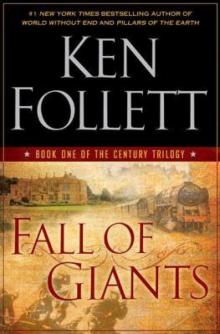 Fall of Giants (The Century Trilogy)
Fall of Giants (The Century Trilogy)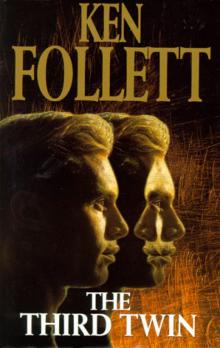 the Third Twin (1996)
the Third Twin (1996)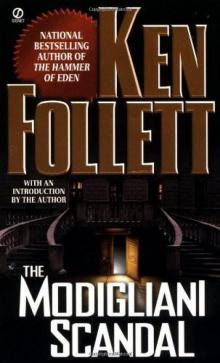 The Modigliani Scandal (1976)
The Modigliani Scandal (1976)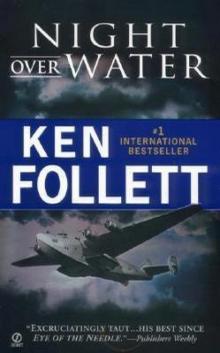 Night Over Water
Night Over Water